Diary of Anais Nin Volume 6 Read online
Page 2
Since any intimate relationship involved other persons, their right to privacy, to protection, was an essential factor to Anaïs Nin. While she could reveal her own highly charged experience of childbirth in minute detail in the first volume of the Diary and in her earlier story "Birth," she respected the privacy, the silence, imposed on her by others, who had requested not to be included in the published work. Though she explored the laborious process of the self-creation of the woman in its endless facets, she remained by choice silent about some relationships.
"Today we live by a savage code; that the life of one man is always to be sacrificed for the benefit of the many, that a public figure belongs to history, that we have a right to know all," Anaïs Nin wrote shortly after the first volume of her Diary had been published in 1966. "We must draw a boundary line indicating where respect for the life of a human being is more important than the satisfaction of sensation-seekers. Writers have given an example of ruthless invasion instead of a lesson in the creative possibilities of intimate portraits. This becomes very crucial in an age which is repudiating the disguises of the novel because it lives through television and films, closer to actuality and the realities of personalities. If our age is noted for alienation it is largely because, in general, we treat each other without tact or sensitivity."
To cover these problems of exposure, certain protective measures could be taken. A character could be veiled in anonymity, given a pseudonym, or eliminated altogether, based on the person's own choice. But perhaps the most important method evolved in Anaïs Nin's effort to employ the writer's craft so thoroughly, so skillfully, "that all sides are heard, all aspects considered ... in such organic development lies a possibility of balance." The inherent dangers of publication perhaps could not be eliminated altogether, but the potential damage could be modified. "The destructive element of truth is neutralized by a deep probing into motivation which makes you understand a character beyond appearances. What is understood is not judged."
Over the past ten years, five volumes drawn from the original diaries have been published. Each one a separate entity, each one part of a larger whole, covering a quarter of a century, from the winter of 1931-32, to the fall of 1955. Today we know that the brilliant flash so anxiously projected by Anaïs Nin in her dream has not produced a hurtful explosion, a singeing exposure of personal relationships, a gossipy exploitation of the now-famous. The blinding radiance has served instead to fully illuminate Anaïs Nin's major creation. It has given us new insight into her fiction, her "artistic" work. It has revealed a woman at last able to face the world, to face herself, liberated from the need to find comfort and security in her hidden notebooks, freed from her multiple disguises, masks and role projections. It has opened up to a vast readership a singular document accessible to a caring personal identification, a compassionate sharing that exceeds in intensity any expectations, any hopes of final recognition, that Anaïs Nin may have projected into that radiant explosion in her dream in 1965.
GUNTHER STUHLMANN
New York
January, 1976
[Fall, 1955]
After my experience with LSD, a whole day and a whole night of overstimulation, restlessness and the most extreme fatigue, I felt as if my body had received near electrocution by too great a current of vibrations. It was not humanly bearable, the concentration of a thousand dreams into one, the total separation from one's center, the total voyage into an atmosphere, a rhythm, a space not in harmony with one's physical body. Yes, too strong a current. I think our dreams, reveries were meant to be absorbed organically and gradually, tempered by daylight, cushioned by humble occupations and drab interruptions. We have to have time to absorb these great charges of metaphysical energies, mix them with daily living, live them out, in a human gradation and human cellular development. A chemistry adapted to our human body: a dream, then awakening, then action, then contact with other human beings, then return to the earth, contact with the earth, with our own body. My fatigue reminded me of Artaud's complaint: Une fatigue de fin du monde (A weariness like the end of the world). I was empty and listless for a long time. I did not write. For the first time the search for the dream was not a beautiful and natural interweaving of night and day, but a total wrench into space, a nonhuman orbiting. I felt something wrong. My self-propelling apparatus was damaged. Forced. Too much and too much violence, and it took many days of passivity to absorb all I had seen and heard.
Finally I did write about it, from notes, from vivid memory, from Gil Henderson telling me what I had done and said. I still felt that our bodies were not adapted to such intensive reverie.
It frightened me that I stopped writing for a long while (except in the diary). A short circuit. Burnt wires and nerves. Burnt energy.
New York.
Riis Park. One inch between each person. All except the Negroes, who are beautiful, look as if they eat nothing but hot dogs, millions of them. But the sea was warmer than the sea in Los Angeles.
I bought a beautiful book on Japanese architecture, so beautiful I cannot bear to send it to Lloyd Wright, I cannot part with it just yet.
Ruth Witt Diamant is here collecting poets for her Poetry Center at San Francisco State College. She has done so much for poetry and poets.
I write to Felix Poliak about the Grecian life of California and he asks me an embarrassing question: "Do you mean devoted to physical culture only, body-centered, without the Grecian balance and harmony of body and mind that produced so much of the beautiful and good, the typically Greek sensuous mentality?"
I am afraid that so far I have seen only the cult of the beach, swimming, suntanning.
So far the majority of the people seem colorless and mentally inert.
Felix Poliak writes me: "I have been thinking about, and repeating in my mind, your marvelous sentence, 'The sea of death carries away a little fragment of our soul's island, with each person we loved or admired.' "
Henry is working on the story of Moricand. He remembers that he was born in Paris January 12, 1890.
He writes me that he wrote some revelatory pages about Capricorn, which was also Moricand's sign, all intuitive, "about the fundamental essence of Capricorn." I cannot remember where this passage occurs. Henry wonders what astrologers would say.
"Am about in the middle of the Moricand chapter now. It will be very long. And—like the last word on the subject." [Book later titled A Devil in Paradise.]
From diary, age eleven: "I have transposed the war in my heart to the war a hundred times more bloody taking place across the ocean."
Letter to jim Herlihy:
I am very proud of my private dedication. The fascinating problem of the irresponsible life. That has been the theme of our month. Just as we discussed it more clearly and openly I realized that we live our irresponsible life in secret. The occasional danger of exposure creates our violent attacks of guilt. Our desire to live everything out will always meet with the obstacle of guilt. The unwillingness to cause pain as well as the unwillingness to accept the judgment of others. One of the most inspiring things about our friendship is that we never pass judgment. I should not even state it as negatively as that: we accepted each other's unconscious self, the hidden one. This gives an elating sense of freedom. Now I solved the problem of not hurting anyone, or hurting with amnesia and chloroform. But I never solved the problem of guilt, which is proved by masochism. I can only get rid of the guilt by atonement. Analysis only helped me to shorten the periods of atonement. When you wrote to me about your restlessness and the guilt you feel for even wishing to be free, I wanted to help you. For that is the real drama, the real tragedy. It might account for all the masochism in the world, the sacrifices, the self-destruction. Guilt is at the core, the toxic effect of Christianity. I have often referred to the history of the Caesars. That is even a greater mystery as they were not religious. They felt all-powerful. They were convinced of their omnipotence and godlessness. They considered themselves the only gods. They all committed
abominations. And each one of them died of guilt, not from sensual excesses, not from war, not from illness but of a madness brought on by guilt. So guilt is even older than Christianity. In your case guilt presents itself in a more subtle form. When success grows near you begin to feel uneasy. You see a more obvious form of atoning for success in Bill and his destructive drinking. You are too clever, people like you too much for you to ruin anything, but you can spoil your enjoyment, and that is more subtle to detect and to cure. Watch for it. It is the real enemy, the real incubus, succubus, the only demon and the only voodoo.
Letter from Jim:
Your letter was a very special event. One doesn't expect the average letter to be so well written. Your description of Reginald as Hamlet in your house was lovely, and your comments on our lives. I needed hearing the things you said, as it has been a great preoccupation lately—the business of living completely. I think that what has caused me pause in this particular period is the fact that, superficially, I have everything I can rationally expect: the basics, like food, etc., relief temporarily from economic pressures, a handsome lover, new short novel appearing, play in preparation for Broadway, etc., and I think that the living out of these events as contrasted with what I had imagined such an ideal condition to be like, is perhaps a little alarming. The great and beautiful high moments of my life have not been realizations of dreams so much as spontaneous wonder and surprise at certain unexpected events; my relationship with you has been constantly punctuated with such moments, and there are others that would seem less spectacular when I enumerate them: the pigeons in Venice, when they landed on my head and hands and shoulders, I felt like they had flown away with me; and certain encounters with strangers and strange places, and certain lines of prose (many of yours), or a moment in a play, etc. I think that what I am discovering is that the great things are not those we plan on but those which simply happen; and so I feel, at times like this, that my life is arranged too rigidly, as if I were living according to some subconscious and partly conscious plan that ruled out certain realms of wonder and magnificence. I think that I have not really said what I set out to say, but that you may be able to get from this the feeling of what I mean. But these feelings are all definitely related to our splendid talk at the Coffee Mill, about freedom from the ordinary, calendars, planned events, responsibilities of a certain order, etc. I would not like to give you the impression that I am unhappy—only that I am doing a lot of thinking about the way my current existence is structured. It is pleasant and exciting but not extraordinary. I think I yearn for the extraordinary, like a true child of the Albatross.
You put your finger on one of the many inspiring elements of our relationship; but your letter itself was another of the elements—extracting such a beautiful thing from a simple little mailbox is really quite astounding. I think that in my life you are an example of the marvelous; and perhaps you make me less content with those elements in it which are not. You keep me on the beam. You keep my target on the clouds. You keep me from selling short. You are mediocrity's executioner. I am constantly stunned by the fact that when you give the command, life jumps through the hoop as if it were your servant.
Your paragraph on guilt, ironically enough, arrived the very morning after I dreamed that I had been guillotined.
Our fear of not being punished seems to plague us even more than the fear of suffering. Which is a shame, because we seem to have built-in crucifixes anyway.
Let me know if you want me to send you my portable guillotine. Or, are you mowing the lawn instead? It's so strange, so funny, that you and I suffer so at our own hands when our greatest flaw is probably that we are too careful of others, too considerate.
One of the recent sessions with Dr. Bogner seemed unimportant yet was enormously effective. It dealt with my calling her up and asking her if she would mind seeing my friend X instead of me because she was in the midst of a crisis whereas I was well. Bogner said she did not mind, but that she had an extra free hour she could give to X and so I could keep my own hour if I wanted to.
When I came we explored this simple incident. It was true that X had greater problems at the moment. It was also true that I had reached a comfortable stage in the analysis and that in the last sessions we always avoided going too deeply into new realms. Bogner did not doubt my goodwill towards X, nor the naturalness of my desire to help her.
"The two are true. I am only wondering why you could not tell me directly what was in your mind. You did not say: 'I feel I don't need analysis, so I would rather not come.' Or else: 'Do you happen to have a free hour for X, who is having difficulties?'"
"Even if I felt that I wanted to keep my light mood and not see you today, wouldn't it be irresponsible to let you know at the last moment when you had reserved an hour for me? I would not have done that anyway. I don't want to be irresponsible, particularly when you inconvenience yourself to fit in my erratic schedule, trips, etc."
"All this sounds true, and is true. But it is this rigid kind of responsibility which makes you feel, as you put it the other day, as if you were 'living in a cast' and which causes your negative rebellions. You could have said: 'Today I don't feel that I need analysis. If it is not inconvenient to you and if you can use the hour for someone else, would you mind if I did not come?' You, in a way, concealed your true feelings—that you did not want analysis—behind X's need and tried to reach in a devious way, by covering your true wish with an altruistic one, your basic desire not to come. That is why I made you come, because I felt this was a perfect example of evasion. You create the trap: a responsibility. You didn't think that I might be glad to have a free hour. You felt the commitment as inflexible. Then you felt the pressure. But not knowing how to extricate yourself without displeasing me or annoying me, you caught on X's need, which was, in reality, a separate issue."
This small issue nevertheless clarified the truth that freedom is an inner attitude, habit, easier to acquire than one imagines. It was like the issue about time. Bogner says the reason that I am always too early (an additional anxiety and stress) is to conceal my rebellion against appointments, organization, discipline. So that the feeling of constriction does not come so much from the duties I have to perform as from the clash between these duties and my anarchic self whom I have to hold in check. The constriction is caused by my own destructive rebellions which I have to control like a pair of wild horses.
Recognizing this was evidently important because since I returned to Sierra Madre I have had a feeling of ease. I have had no destructive, negative rebellions (against housework, loud radios). They do not affect me. And because I do not fight them I work more easily. Also because I do not fight them (they are the price for my life here), I can be more humorous and relaxed.
To sum up an extraordinary change caused by analysis. A month without depressions, anxieties or nervousness. I feel installed in the present. I give myself to it. I no longer feel angers, walls, hostilities in relation to the world. My criticalness has lessened. I enjoy what comes. I am not nervous beforehand. I am gay and free. The fears have decreased, the fears of being unable to earn a living, the fears of losing love. There is less rebellion, more smoothness and lightness in living. There is an ability to throw off anxiety. There is no bitterness, no friction, and my anger against America for not accepting my work has gone. Having fewer conflicts I get less tired and accomplish more. I can do housework half a day, write half a day and still go out at night. Lightness and a feeling of strength. It all consolidated this month. It is true I may die without seeing Bali but then I have other things to make up for that. I can make one human being happy. I am close to one human being and closer than before to others. My genuine gentleness is coming back. I do not expect others to love or understand my work. I am not bitter or hurt. So much accomplished. I went to a party; in the past a part of me would hold back because the people were not interesting; this time I entered uncritically, accepting it on its own level Contentment. It took me a lifetime to learn that happin
ess is in quiet things, not the peaks of ecstasy. I am grateful for what I have. I feel reintegrated into the human family. I see Americans as people in trouble, not happy on a deep level. I want to help, to teach. To share and impart the wholeness I feel and the strength. I feel strength from my effort to learn first aid. I have overcome the neurosis at last.
[Winter, 1955–1956]
The New York Times:
Moon is on sale only $1 an acre. Long Islander doing land office business in deeds to crater bottomland. For one dollar this is what the lunar buyer gets: A general quit claim to an acre of good crater bottomland. The fine print disposes of the mineral rights (including uranium). It gives the buyer fishing and winter sports rights near the site he purchased. A brochure describing the wonders of the moon as they are at present envisioned by the developer of the area. The brochure waxes enthusiastic in the time-honored manner of real estate promoters. A map that shows the purchaser how he can see his land through a powerful telescope. The scheme is the invention of Robert R. Cole, a former chairman of the Hayden Planetarium. Mr. Cole is now doing business as Robert R. Cole, President of the Interplanetary Development Corporation with an office at the Little Museum, Seven The Place, Glen Cove, Long Island. Copernicus, the crater staked out by Mr. Cole, contains about's,000,000 acres. More than 3,000 craters have been observed by astronomers on the side of the moon facing the earth. Mr. Cole has made no claims to the other side.

 Diary of Anais Nin, Volume 5
Diary of Anais Nin, Volume 5 A Spy in the House of Love
A Spy in the House of Love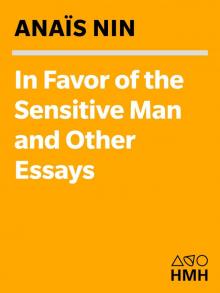 In Favor of the Sensitive Man and Other Essays (Original Harvest Book; Hb333)
In Favor of the Sensitive Man and Other Essays (Original Harvest Book; Hb333)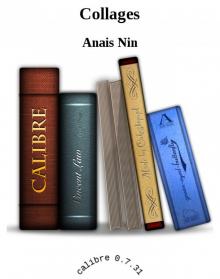 Collages
Collages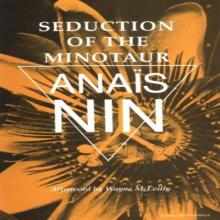 Seduction of the Minotaur
Seduction of the Minotaur Children of the Albatross
Children of the Albatross Delta of Venus
Delta of Venus The Four-Chambered Heart coti-3
The Four-Chambered Heart coti-3 Diary of Anais Nin, Volume 2
Diary of Anais Nin, Volume 2 Diary of Anais Nin, Volume 1
Diary of Anais Nin, Volume 1 Diary of Anais Nin, Volume 4
Diary of Anais Nin, Volume 4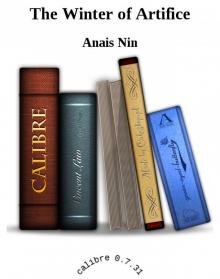 The Winter of Artifice
The Winter of Artifice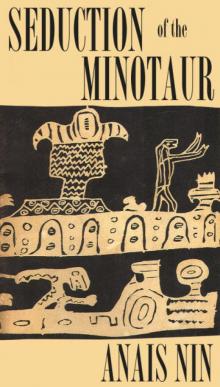 Seduction of the Minotaur coti-5
Seduction of the Minotaur coti-5 Children of the Albatross coti-2
Children of the Albatross coti-2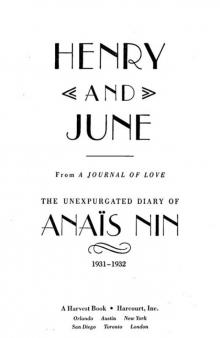 Henry and June: From A Journal of Love -The Unexpurgated Diary of Anaïs Nin (1931-1932)
Henry and June: From A Journal of Love -The Unexpurgated Diary of Anaïs Nin (1931-1932) Ladders to Fire
Ladders to Fire House of Incest
House of Incest